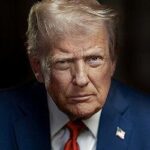Exploring the Resonance of Cyrus the Great in Contemporary Israeli Politics
In recent times, the figure of former U.S. President Donald Trump has increasingly surfaced in discussions within Israel, with many supporters likening him to Cyrus the Great, an ancient Persian monarch. Advocates of this analogy commend Trump’s policies as revolutionary for Israel, particularly highlighting his administration’s acknowledgment of Jerusalem as its capital and the facilitation of the Abraham Accords. But who was Cyrus the Great, and why is this comparison significant? This article delves into Cyrus’s legacy—a ruler celebrated for enabling Jewish exiles to return to their homeland—and examines what it means to associate him with a modern political figure. As Israelis navigate their intricate political landscape, invoking Cyrus raises essential questions about leadership, historical legacies, and how narratives shape contemporary identities.
Cyrus the Great: A Model of Enlightened Leadership
Cyrus the Great is often hailed as a paragon of enlightened governance and an early advocate for human rights. He founded the Persian Empire which reached its peak from Greece to India. His reign is characterized by progressive policies that allowed conquered peoples to preserve their customs and religions—an approach that fostered stability and cultural diversity. Key elements defining his legacy include:
- The Cylinder of Cyrus: Frequently regarded as one of history’s first declarations on human rights, this artifact outlines his principles promoting tolerance towards various cultures.
- Diplomatic Acumen: Rather than relying solely on military might, Cyrus believed loyalty could be cultivated through respect.
- Legal Reforms: He enacted changes that dismantled oppressive regimes while advocating equality before law.
Cyrus holds particular significance in Jewish history due to his decree permitting Jews to return from Babylonian exile and rebuild their temple—a momentous event echoing through time. By issuing this edict, he not only liberated a subjugated people but also conveyed a broader message about freedom and hope. In today’s context, figures like Donald Trump are compared with Cyrus based on their perceived roles in advancing specific groups’ interests or national agendas—prompting deeper reflections on authority versus liberty within contemporary geopolitics.
Trump’s Influence on Israeli National Identity: Exploring Historical Parallels
The discourse surrounding American foreign policy has seen former President Donald Trump compared with Cyrus the Great, revered for his enlightened rule over Persia. This analogy arises primarily from Trump’s steadfast support for Israel during his presidency—most notably when he recognized Jerusalem as its capital in 2017—a move many Israelis viewed as reminiscent of Cyrus’s historic decree allowing Jews back into their homeland after Babylonian captivity. The similarities drawn between these two leaders highlight a revival of hopeful nationalism, where Trump’s actions are seen by some as fulfilling prophetic promises regarding Jewish return.
Supporters frequently cite several shared characteristics between both leaders:
- Lifting Up Marginalized Groups: Just like how Cyrus enabled Jews to reconstruct their temple, Trump’s policies have empowered right-wing factions within Israel regarding territorial claims.
- A Shift in Political Dynamics: Trump’s strong support for Israel has invigorated political conversations akin to how Cyrus unified diverse populations under one vision.
- A Symbolic Figurehead: The narrative surrounding Cyrus serves today as an emblematic representation of resilience amidst regional challenges faced by Israelis.
| Cyrus the Great | Donald Trump |
|---|---|
| Paved way for Jews’ return from Babylonian captivity | Acknowledged Jerusalem’s status as Israel’s capital |
| Pioneered religious tolerance across cultures | Bolstered U.S.-Israel relations significantly |
The Cultural Significance: How Historical Figures Influence Modern Politics in Israel
The admiration for historical figures plays a crucial role in shaping contemporary political narratives within Israel; many citizens draw connections between Donald Trump—the 45th President—and ancient king Cyris II (Cyrus). Celebrated historically among Jews for allowing them back into Jerusalem post-Babylonian exile around 6 BCE—this act symbolizes mercy and restoration at its core—is echoed today through leaders like Trump who facilitated moving America’s embassy there while recognizing Israeli sovereignty over Golan Heights; some view such actions akin to those taken by Cyrus himself during antiquity.
This evocation reflects deep-seated cultural desires seeking validation from powerful allies while reinforcing continuity throughout history concerning security needs faced by modern-day Israelis seeking legitimacy globally.
This cultural lens extends beyond mere symbolism—it shapes public sentiment alongside party loyalties too! Supporters often express belief that current events resonate strongly with biblical themes emphasizing sovereignty alongside freedom worship practices nurtured via social media platforms & rallies where references made toward Cyrian legacies serve validating purposes behind present-day strategies employed politically speaking! Such dynamics create environments wherein historical allusions bolster ongoing dialogues around divine providence intertwined intricately alongside tactical maneuvers influencing international relations shaped heavily influenced past triumphs/tribulations experienced collectively throughout time!
Conclusion: Insights Into Leadership Complexities Through Historical Lenses
The comparison between Donald Trump and Cyrus II illustrates intricate relationships connecting historical legacies with present-day politics resonating profoundly across Israeli society today! As numerous individuals regard ancient Persian kingship symbolizing deliverance & autonomy—the echoes stemming forth indicate significant impacts arising out these narratives upon shaping identities/governance structures alike.
However whilst such analogies evoke feelings rooted deeply tied together hopefulness—they simultaneously raise critical inquiries regarding nature itself concerning leadership styles/multiple interpretations surrounding influential characters existing amid our ever-evolving geopolitical landscapes ahead! Discussions revolving around both men will likely continue evolving just like they did previously leaving lasting impressions upon respective eras they inhabited respectively.
As we look forward navigating future paths ahead—it becomes evident lessons learned derived directly drawn forth past experiences will play pivotal roles guiding trajectories moving onward!
`









